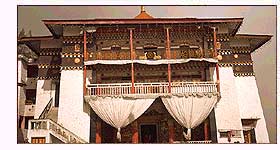Beijing fixated on a Buddhist monastery in India
by Jonathan Manthorpe, Vancouver Sun, October 10, 2007
Arunachal Pradesh, India -- A Buddhist monastery founded high in the Himalayan mountains more than three centuries ago has become a key piece of real estate in the tussle between China and India for power and influence in Asia.
 << Tawang Monastery
<< Tawang Monastery
The Tawang Monastery is the second most revered home of Tibetan Buddhism after the great Potala Palace at Lhasa, the capital of Tibet.
But Tawang is not in Tibet, and here's the cause of the friction. It is in India's Arunachel Pradesh province and it is unlikely that the agriculturally productive region of 2,000 square kilometres was ever part of Tibet.
China, which invaded and seized Tibet in 1951, insists that Tawang district and its monastery are part of what Beijing calls the Tibet Autonomous Region and is therefore part of China.
The entire 4,000-kilometre-long border between China and India is a matter of dispute, was the cause of a short but bloody war in 1962 and has been the subject of unsuccessful negotiations since 1981.
But the Tawang Monastery is a fixation in Beijing.
Forcing India to give up the monastery would be a demonstration of China's superiority in the race for Asian superpower status.
But more important than that, possession of Tawang has become in Beijing's eyes essential to legitimizing its control over Tibet.
To that end Beijing thinks that possessing Tawang will enhance its authority when, as the Communist party has made clear it intends, it chooses the next head of Tibetan Buddhists, the Dalai Lama, when the current incarnation who is 72 years old dies.
The Dalai Lama, who fled Tibet after the 1951 Chinese invasion and lives with thousands of other exiled Tibetans at Dharamshala in northern India, is trying to thwart Beijing's efforts to nationalize and neuter Tibetan Buddhism.
The Dalai Lama and his followers got a sharp picture of Beijing's intentions in 1995 after the death of one of Tibetan Buddhism's most senior clerics, the Panchen Lama.
One of the Panchen Lama's tasks is to oversee the search for the reincarnation of the Dalai Lama when the current office holder dies.
In the same way it is the Dalai Lama's duty to monitor the search for the reincarnation of a Panchen Lama, which the Dalai Lama did in 1995 and identified a six-year-old boy in Tibet.
This boy and his family were immediately detained by Chinese authorities and have not been seen since.
Beijing then used quisling Tibetan monks to identify another boy as the new Panchen Lama and that boy is being raised under Beijing's care.
There is no doubt that any hunt for a new Dalai Lama under the guidance of this Panchen Lama will produce a reincarnation who in adulthood will urge Tibetans to happily accept China's occupation of their homeland.
The Dalai Lama has attempted to frustrate China's devious plans by saying in 2002 that if Tibet is not free when he dies, he will reincarnate in a free country elsewhere.
He did not identify Tawang as the place where the next Dalai Lama may be discovered, but it makes a lot of sense to many Tibetan Buddhists. It is in the "free" country of democratic India, most of the people in the region around the monastery follow Tibetan Buddhism, it is an historic centre of the religion and in the 18th century the sixth Dalai Lama was born there.
Last month Beijing issued an edict saying that senior Tibetan Buddhists cannot be reincarnated outside China and not without the recognition of Chinese authorities.
It may seem decidedly odd to many people that the Chinese Communist party, an atheist organization, is so determined to assume divine responsibilities of choosing religious leaders. But Beijing's aim is to ensure that there is no organization in China which the Communist party does not control.
The Tawang Monastery issue has become a fixation among senior Beijing officials as they become more and more concerned that they have underestimated the political and economic challenge they face from India. India is equally determined not to give up Tawang district and its people.
Last month Beijing issued an edict saying that senior Tibetan Buddhists cannot be reincarnated outside China and not without the recognition of Chinese authorities.
It may seem decidedly odd to many people that the Chinese Communist party, an atheist organization, is so determined to assume divine responsibilities of choosing religious leaders. But Beijing's aim is to ensure that there is no organization in China which the Communist party does not control.
The Tawang Monastery issue has become a fixation among senior Beijing officials as they become more and more concerned that they have underestimated the political and economic challenge they face from India. India is equally determined not to give up Tawang district and its people.

 << Tawang Monastery
<< Tawang Monastery